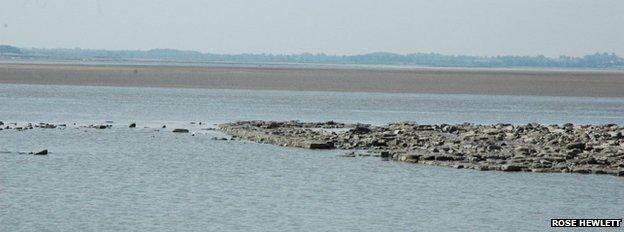18th Century River Severn breakwater rediscovered
- Published

Hock Crib was built by the fourth Earl of Berkeley in 1739
An 18th Century breakwater on the River Severn in Gloucestershire has been rediscovered.
The stone structure, known as Hock Crib, near Frampton-on-Severn, was built to protect farmland from erosion.
Until recently it was buried beneath sandbanks and is now only visible at extremely low tide.
Two local historians have been given a grant to photograph and record its remains using a camera mounted in a remote controlled helicopter.
Rose Hewlett and Arthur Price have been given a £430 grant by the Bristol and Gloucestershire Archaeological Society (BGAS) to study the site at Fretherne.
Ms Hewlett said the structure, which was also referred to as the Great Bulwark, was built in 1739 by the fourth Earl of Berkeley.
"Hock Crib comes up in the records for Frampton, and is also mentioned in the Berkeley Castle records," she said. "It's always fascinated me."
'Old maps'
Ms Hewlett said a crib is a local term, used along the Severn Estuary, for a breakwater.
"We knew that it had gradually decayed. We could see it mentioned on old maps and in the records in different archives," she added.
"To the untrained eye it looks like a pile of stones. When you get very low tides you can see the foundations of the curved wall."
Ms Hewlett said conditions in the river were now right for the structure to be identified because the main deep river channel has recently shifted towards the eastern bank, keeping the sand from covering the foundations.
"It's an interesting piece of archaeology on the Severn Estuary. Sea defences have been built here since Roman times, it was important to defend the land," she said.
"We've now been given the opportunity to safely explore the archaeology. It's not the sort of place where you want to be stood out there doing a lot of measurements with the tide bearing down on you."
It is hoped the archaeological survey will be carried out some time next year.
- Published22 September 2010